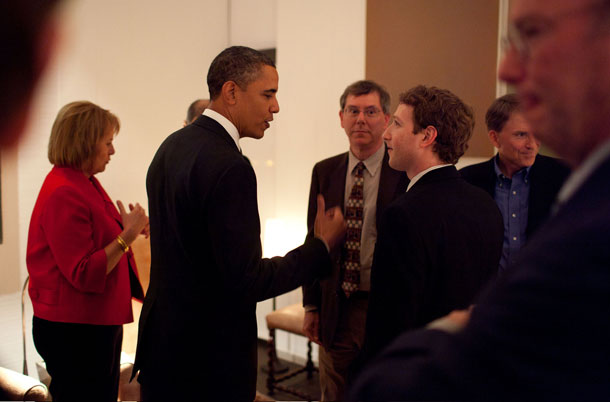Former President Barack Obama tried to warn Facebook CEO Mark Zuckerberg about the threat of fake news and its effect on the 2016 election less than two weeks after Donald Trump won the presidency, The Washington Post reported on Sunday.
Nine days before Obama warned him about the effect fake news had on the November result and the problem it would pose in future elections, Zuckerberg struck down the notion as a “crazy idea” that “surely had no impact” on the end result.
Following the president’s warning, Zuckerberg acknowledged the problem but said fake news wasn’t widespread on Facebook, according to The Post. He added at the time that there was no easy solution to the issue, according to those familiar with the matter.
Obama’s appeal to the tech titan came following months of indecision within the administration’s ranks about what to do about the elaborate and multi-faceted campaign Russia launched to interfere in the US election.
The Post found in June that even after Obama and his senior aides were provided with an intelligence report detailing how Russian hackers had breached the Democratic National Committee's servers in an attempt to damage Clinton's candidacy, they failed to act. That failure, the report said, was born out of an assumption that Clinton would win the November election regardless.
Russia's meddling was a multi-pronged effort that included, among other things, amplifying the propaganda value of leaked DNC emails with a disinformation campaign waged predominantly on Facebook and Twitter, in an effort to use automated bots to spread fake news and pro-Trump agitprop.
Facebook reportedly discovered traces of Russian activity on its platform five months before Zuckerberg's conversation with Obama. Last June, cybersecurity experts at the company found that the Russian hacking group Fancy Bear was setting up several "shadowy accounts" on Facebook to amplify the reach of the hacked DNC emails, according to The Post. The US intelligence community has said Fancy Bear is an extension of the GRU, which is Russia's military intelligence arm.
Facebook reportedly contacted the FBI at the time, but determined upon examining the accounts further that they were financially motivated and did not seem linked to a foreign government.
Facebook recently came under the microscope after it emerged that fake accounts linked to Russian entities used the platform to spread disinformation and bought $100,000 worth of divisive political ads leading up to the election.
The company still does not know the extent of Russia's ad purchases or whether these unidentified ad buys are still on the site. Facebook has since confirmed that Russia-linked groups went further than buying ads and posting memes - they tried to organize anti-immigrant, anti-Clinton rallies in Texas and Idaho.
Zuckerberg said in a statement on Thursday that the company was examining how the presidential campaigns used its tools to promote ads or other content during the election.
In doing so, Facebook will look not only into "foreign actors, including additional Russian groups and other former Soviet states," Zuckerberg said, but also "organizations like the campaigns" to further its "understanding of how they used our tools."
Natasha Bertrand contributed reporting.


